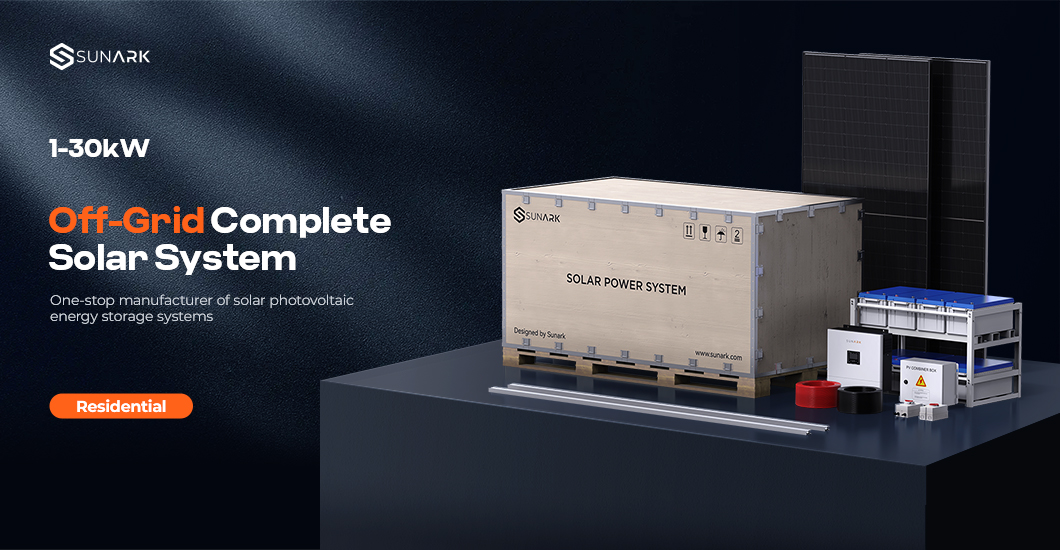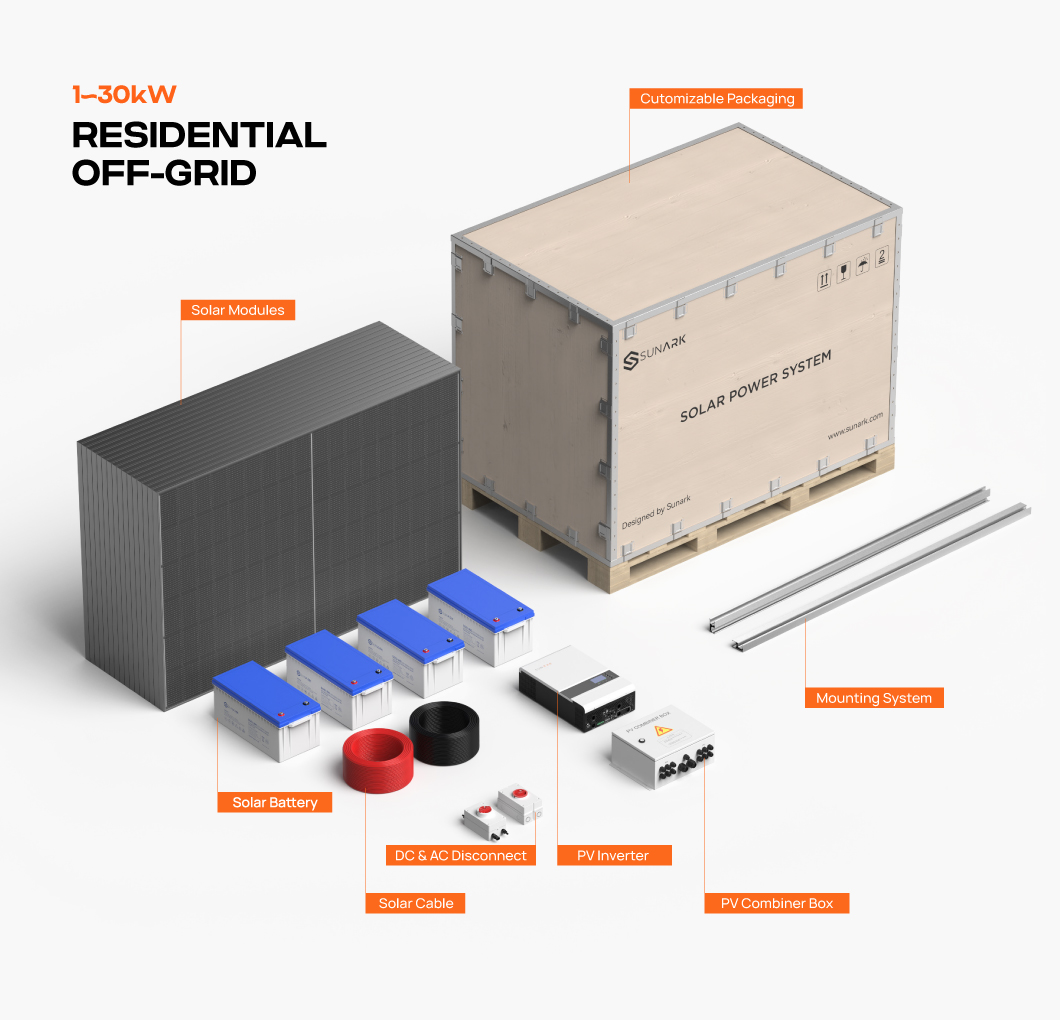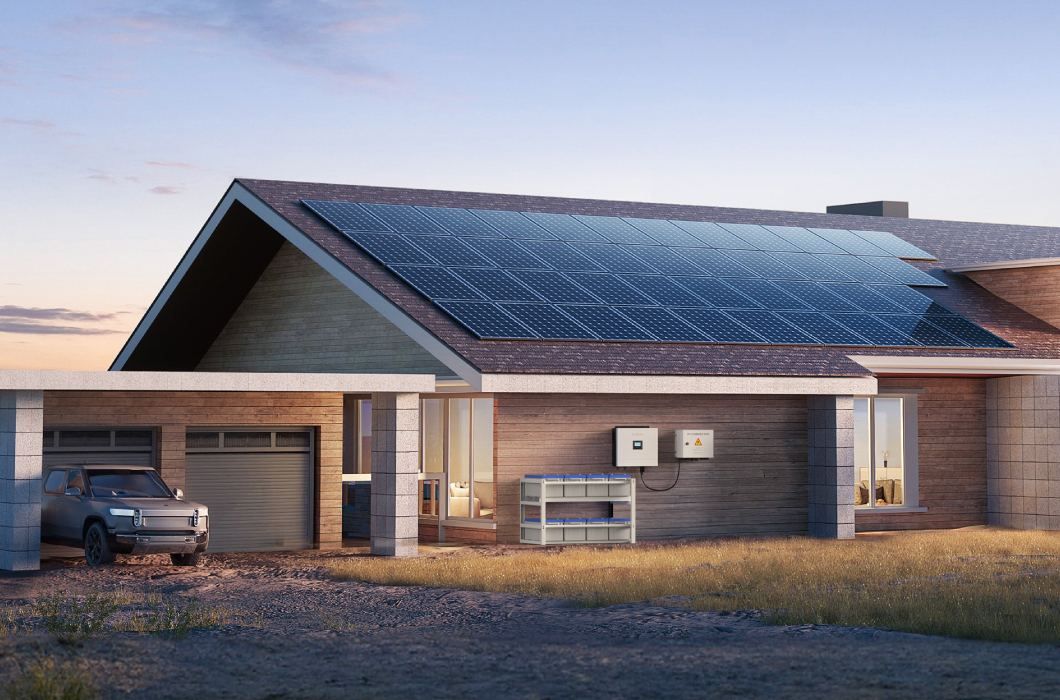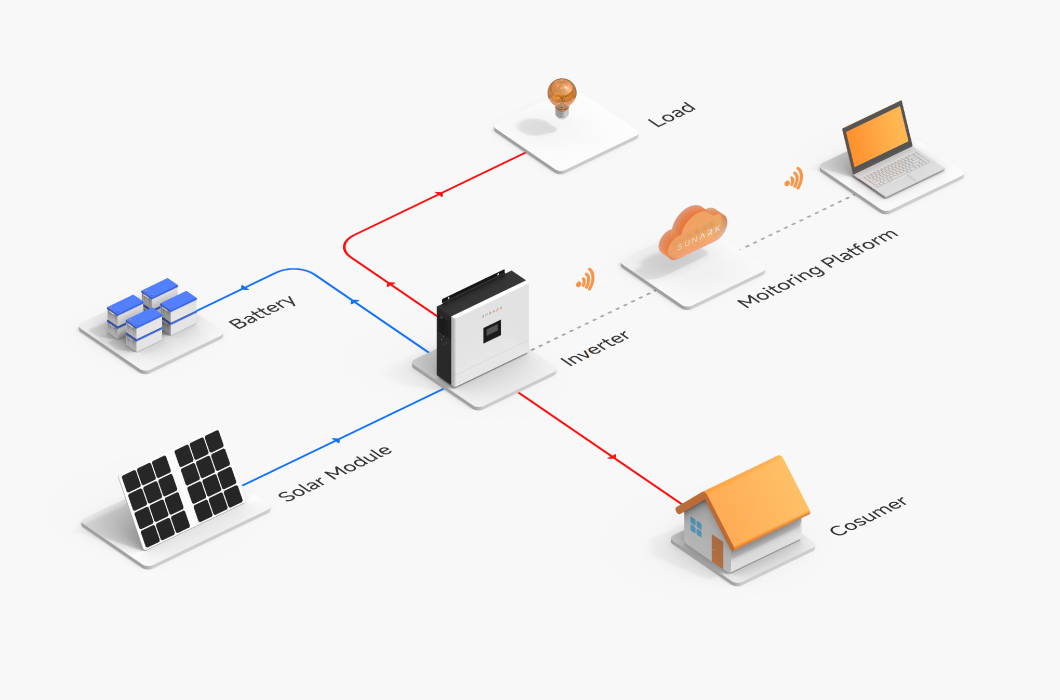An off-grid solar system, also known as a standalone solar system, is a renewable energy system that operates independently from the electrical grid. It generates and stores electricity using solar panels and batteries, allowing you to power your home, cabin, or other structures without relying on the traditional utility grid.
MODEL:
SE1-30KW-OFFPV MODULE:
550WINVERTER POWER:
3-50KWBATTERY BANK:
5-100KWHMOUNTINGS:
CustomizedAPPLICATION:
Roof and GroundOEM:
Supported
Here's a general overview of how an off-grid solar system works:
Solar Panels: The system includes solar panels, also known as photovoltaic (PV) panels, which convert sunlight into electricity. The panels are typically installed on the roof or in an area with maximum exposure to sunlight.
Charge Controller: A charge controller regulates the amount of charge going into the batteries and prevents overcharging. It helps optimize battery life and performance.
Battery Bank: The energy generated by the solar panels is stored in a battery bank. Batteries play a crucial role in an off-grid system by storing excess energy produced during the day for use when the sun is not shining, such as at night or during cloudy weather.
Inverter: The direct current (DC) electricity stored in the batteries needs to be converted into alternating current (AC) electricity for most household appliances and electronics. An inverter performs this conversion, making the electricity compatible with standard AC devices.
Loads: The electrical energy produced by the solar panels and stored in the batteries is then used to power different loads, including lights, appliances, and other electrical devices. It's important to size the system properly based on the energy needs and expected daily load to ensure it can provide sufficient power.
Backup Generator: In some cases, an off-grid solar system may include a backup generator. The generator can be used to recharge the batteries during extended periods of low sun or high energy demand. It provides an extra source of power when the solar panels and batteries are not sufficient.
Monitoring and Control: To manage and monitor the system, you can use a charge controller with display features or a remote monitoring system. These tools allow you to keep track of battery charge levels, solar panel performance, and overall system status.
Designing an off-grid solar system requires careful consideration of energy consumption patterns, location, sun exposure, and other factors. It's recommended to consult with a professional solar installer or engineer experienced in off-grid systems to ensure an efficient and reliable setup tailored to your specific requirements.

The following mainly introduces the three main application fields of photovoltaic grid-connected power generation.
Agricultural electricity
In the field of agricultural production with relatively harsh outdoor environment, photovoltaic grid-connected power generation can use sunlight to help farmers solve problems such as irrigation of cultivated land and electricity use in farmers' markets. Through solar photovoltaic power generation systems, a more reliable and economical way of electricity use can be provided for rural areas, and pollution can be effectively reduced.
Residential households
The photovoltaic grid-connected power generation system can be directly connected to the household power grid, convert sunlight into electricity through solar panels for household use, and supply excess electricity back to the grid. This can not only reduce household electricity costs, but also reduce carbon dioxide emissions. It is an effective way for household energy conservation and emission reduction.
Industrial electricity
Photovoltaic grid-connected power generation can be widely used in industrial production enterprises and commercial buildings. Its main function is to reduce dependence on energy, reduce electricity costs and reduce emissions. It is an important means of energy conservation and emission reduction.

Off grid solar system work principle:
The off-grid solar system works by collecting sunlight through the solar panels, which generate DC electricity. The charge controller ensures that the batteries are charged efficiently and prevents overcharging. The excess electricity not immediately used by the appliances is stored in the battery bank. When you need electricity, the inverter converts stored DC power into AC power, allowing you to power your devices.
Since off-grid solar systems operate independently of the grid, they are typically designed to meet your specific energy needs. Sizing the system involves determining the appropriate number and capacity of solar panels, battery storage capacity, and inverter size based on your electricity consumption patterns and the desired level of energy independence.
It's important to note that off-grid solar systems require careful design, maintenance, and monitoring to ensure optimal performance and efficient use of energy

People choose solar systems over diesel generators for several reasons:
Renewable Energy: Solar power is a clean, renewable energy source that relies on sunlight, which is abundant and free. Unlike a diesel generator, which requires fuel (typically diesel or gasoline) to operate and emits pollutants, solar systems generate electricity without relying on non-renewable resources or producing harmful emissions.
Cost Savings: While the initial cost of installing a solar system can be higher compared to a diesel generator, solar systems have lower operating costs in the long run. Once installed, solar systems generate electricity at no additional cost, whereas diesel generators require ongoing fuel purchases. Over time, the savings on fuel costs can offset the initial investment.
Environmental Impact: Solar power is a sustainable energy solution that contributes to reducing greenhouse gas emissions and combating climate change. Diesel generators, on the other hand, release carbon dioxide (CO2), nitrogen oxides (NOx), sulfur dioxide (SO2), and particulate matter into the atmosphere, contributing to air pollution and environmental degradation.
Noise and Maintenance: Diesel generators are typically noisy and require regular maintenance, including fuel refills, oil changes, and filter replacements. Solar systems, on the other hand, operate silently and have minimal maintenance requirements. With no moving parts, solar panels are durable and can last for decades with proper care.
Grid Independence: Solar systems allow homeowners to become more self-sufficient by generating their own electricity. This reduces dependence on the electrical grid and provides a reliable source of power
FAQs:
Q1: Do you support OEM/ODM?
A:Definitely, OEM&ODM service is supported with a certain quantity,including customize logo,package and label;
Q2: What's the production time?
A: The production time is normally 15 working days. but we will always prepare some stocks for popular models.
Q3: Can you provide DDP service?
A:Yes, if you are a personal customer and don't want to deal with the customs, we can provide DDP service to your address.
Q4: What about the warranty and how to claim?
A: Warranty period are 10 years since you receive the product, our professional after-sales team will deal with all warranty issues.